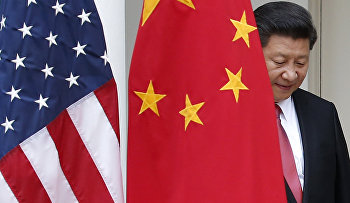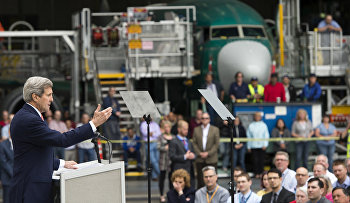It's a grand delusion that the US will solve all of the EU problems. Let there be no illusions about TTIP. Mind boggling rhetoric: "The largest bilateral trade agreement in history" (David Cameron); "Economic NATO" (Hillary Clinton); "A political lever to promote European – and universal – values around the world. (Cecilia Malmstrom). Transatlantic trade and investment partnership (TTIP), which is currently being negotiated between the EU and the US can become reality in 2016. It is not a classical free trade agreement, which should focus on the reduction or elimination of customs duties on goods and import restrictions. This agreement is much broader and involves opening up of markets on both sides of the Atlantic, regulatory cooperation and agreement on norms and standards. It is the most ambitious trade agreement of the European Commission and it's a unique opportunity to make the international trade patterns more stringent.
Anger as government blocks TTIP legal documents relating to health service https://t.co/TmcdL7cRMa
— The Guardian (@guardian) January 26, 2016
As noted, the signing of TTIP will bring numerous benefits: growth of the total European GDP; increase in export earning and facilitation of investment in the North American market; expansion of job market and household income growth. However, the critics of the treaty do not seem to be convinced by these arguments, especially NGOs and various civil society movements (STOP TTIP! platform). According to these groups, the negotiations of the agreement are not transparent enough and TTIP will have mostly negative effects such as: neglect and abuse of environmental issues; restriction of internet freedom; impairment of food sovereignty; financial deregulation growth. Moreover, it can give international investors, especially multinational corporations, an unfair advantage over separate states and citizens in general.
At the moment, it's impossible to completely evaluate TTIP's potential impact, without knowing all the components of the treaty. Today we can only speculate about it and make conclusions using estimated gains and losses. In any case, one can't define the agreement as "mutually beneficial" and advantageous for both sides. This is easy to prove. There are at least three levels of the analysis of its impact: the EU level, the member states level, and the industrial level (this is also true for the United States). Hypothetically, considering that the agreement may be favorable for the whole EU, does not really mean that it will be good for each member state separately. Even the general economic benefits can't guarantee that there won't be any losers.
'TTIP is unacceptable & needs reform' John McDonnell speaking to @Underground_RT — see the full interview tomorrow https://t.co/uJSIpKt6Uj
— RT UK (@RTUKnews) January 22, 2016
Take Portugal, for instance. Though being presented as an economy which is able to reap the benefits of the agreement, its impact on the industry may not be so obvious. If the shoe industry, having had opened up to the American market goes through a period of growth — the tomato production, on the contrary due to the increased competition from US producers, may suffer a major setback. We can give multiple examples as well as many possible impact options either of employment in different economic sectors, or on the consumer level. So there is every reason to be wary of TTIP's possible economic successes.
Moreover, the Investor-State Dispute Settlement mechanisms (ISDS) is quite questionable too. Critics of the agreement see this as one of the main factors that prove that TTIP's corporate interests outweigh those of the public and state. At the end of 2015 after the concerns and a strong public outcry the Commission proposed to replace ISDS with a special legal investment system (Investment Court System). It is expected that the new twelfth round of negotiations in Brussels, in February of this year, will produce the outlines of the judicial system and a draft agreement of the TTIP will be released.
TTIP is a trade and economic agreement, but the arguments in its favor affect the geopolitical and democratic values as well. Do they hold validity? It is worth taking a closer look at it through the prism of the EU and the US. One of the most common ideas is that TTIP will help to preserve the economic and political domination of the West (the US and the EU) and its democratic values in the 21 century, despite the rise of China (and the Asia-Pacific region) and its model of authoritarian capitalism. The argument looks very persuasive, but it doesn't hold up against any serious criticism.

The European Union is only a (dependent) part of the US's global strategy, and in no any way an equal partner, which would imply to the use of the term "the West". This way of thinking let Hillary Clinton label TTIP as an "Economic NATO". Neither proponents, nor critics of NATO doubt that this military-political union is a dominance tool for the US. Due to its chronic political disagreements and lack of investment in its security and defense, Europe by its own fault appears to have no real autonomy. The argument for protection of democratic values in the face of authoritarian capitalism, has also reasonable grounds for skepticism. This argument has been used by the US in the 1990s to justify China's entry into the World Trade Organization (WTO). Apparently, it was associated with the possible economic and commercial benefits, which did not prove to be the case. This does not mean that China today is a more liberal democracy than it was before. Moreover, failure to respect human rights and a lack of democratic values in China, have not prevented major US and European multinational corporations from entering the Chinese market and breaking out at their full capacity. Incredible as it may seem, even the most advanced internet censorship technology was provided to China by a US multinational corporation.
It is easy to understand that the strategy of the United States is now focused on the Asia-Pacific region, which (from the US perspective) is challenging its global hegemony. The strategy includes the containment of China, adapted to the current globalization context. It is apparent by the reorganization of the US Armed Forces and its cutback in Europe and the Atlantic, meanwhile strengthening its presence in the Asia-Pacific region. Closing the Lajes military base in the Azores seems to be a part of the grand strategy.
The Trans-Pacific Partnership (TPP) negotiations, which completed in October 2015, also represents economic and commercial aspect of the US's scheme. According to the US, all indisputable geopolitical advantages for the trade agreement are present in the Trans-Pacific Partnership. The Association of Southeast Asian Nations (ASEAN) is another strategic interest of the US. (See the US Department of Defense Special Report: Asia-Pacific Rebalance).

It is also important to bear in mind that the US is much less interested in Europe in both cultural and sociological aspects. Latin Americans and Asians are becoming a more significant part of the US population. In a few decades, they will possibly represent the majority of the nation's population. It's a very old fashioned, outdated view of the Atlantic being the center of the world and the US being an Anglo-Saxon country.
At best, TTIP will be able to reduce the impact of the US's current reorientation to the Asia-Pacific region and will improve some economic well-being. In any case, it won't have an entire beneficial effect, but will only bring value to certain corporations and industries, due to the reasons mentioned above. Both economic and the social spheres will have their winners and losers. At worst, the agreement will aggravate Europe's already existing globalization problems, which are challenging the heart of the European social model. It will not bring significant geopolitical advantages for European security and the Renaissance of Transatlanticism. The biggest misconception about the US is the hope that it will solve the problems of the EU. Let there be no illusions about TTIP.






